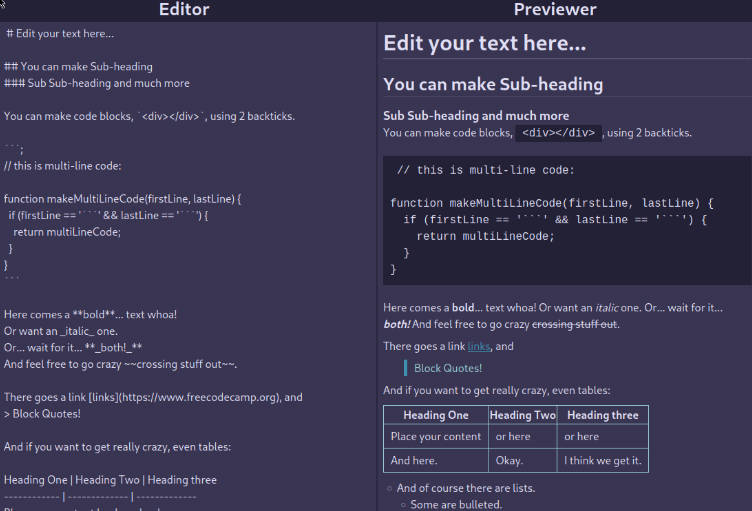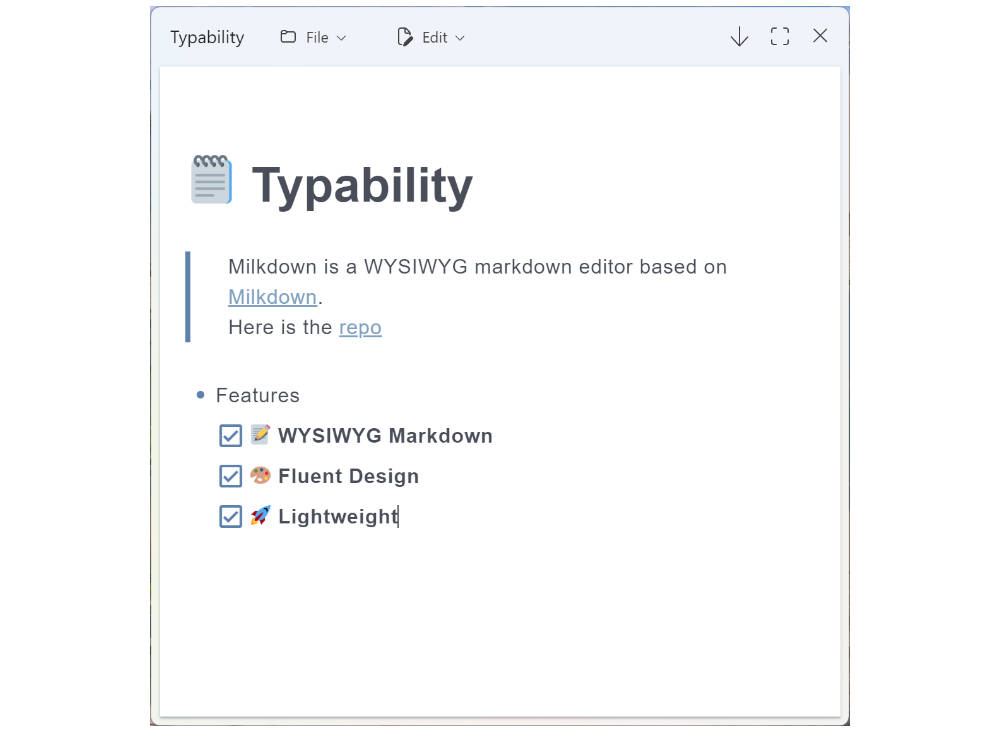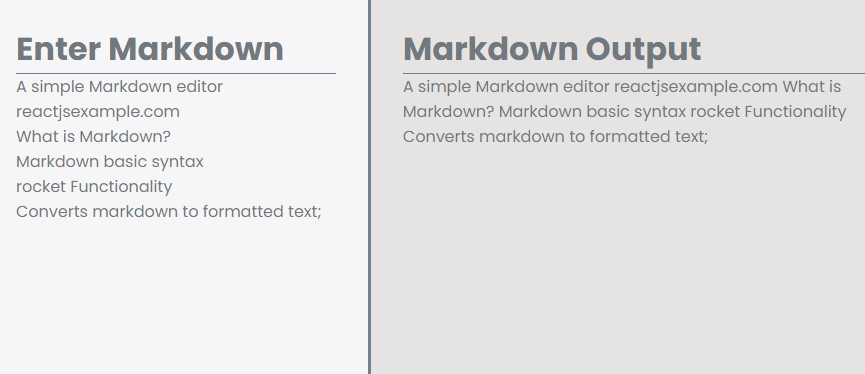Notice: Unmaintained
This repo is no longer maintained, however there are many alternatives:
- Markdown-It
- Showdown
- Marked
- and more...
markdown-js
Yet another Markdown parser, this time for JavaScript. There's a few
options that precede this project but they all treat Markdown to HTML
conversion as a single step process. You pass Markdown in and get HTML
out, end of story. We had some pretty particular views on how the
process should actually look, which include:
- Producing well-formed HTML. This means that
emandstrongnesting
is important, as is the ability to output as both HTML and XHTML - Having an intermediate representation to allow processing of parsed
data (we in fact have two, both JsonML: a markdown tree and an HTML tree) - Being easily extensible to add new dialects without having to
rewrite the entire parsing mechanics - Having a good test suite. The only test suites we could find tested
massive blocks of input, and passing depended on outputting the HTML
with exactly the same whitespace as the original implementation
Installation
Just the markdown library:
npm install markdown
Optionally, install md2html into your path
npm install -g markdown
In the browser
If you want to use from the browser go to the releases page on GitHub and
download the version you want (minified or not).
Usage
The basic interface is:
md_content = "Hello.\n\n* This is markdown.\n* It is fun\n* Love it or leave it."
html_content = markdown.toHTML( md_content );
toHTML also accepts a dialect argument:
md_content = "Vessel | Captain\n-----------|-------------\nNCC-1701 | James T Kirk\nNCC-1701 A | James T Kirk\nNCC-1701 D | Picard";
html_content = markdown.toHTML( md_content, 'Maruku');
Node
The simple way to use it with Node is:
var markdown = require( "markdown" ).markdown;
console.log( markdown.toHTML( "Hello *World*!" ) );
ES6
import {markdown} from 'markdown';
console.log( markdown.toHTML( "Hello *World*!" ) );
Older versions of node
We only officially support node >= 0.10 as the libraries we use for building
and testing don't work on older versions of node. That said since this module
is so simple and doesn't use any parts of the node API if you use the pre-built
version and find a bug let us know and we'll try and fix it.
Browser
It also works in a browser; here is a complete example:
<!DOCTYPE html>
<html>
<body>
<textarea id="text-input" oninput="this.editor.update()"
rows="6" cols="60">Type **Markdown** here.</textarea>
<div id="preview"> </div>
<script src="lib/markdown.js"></script>
<script>
function Editor(input, preview) {
this.update = function () {
preview.innerHTML = markdown.toHTML(input.value);
};
input.editor = this;
this.update();
}
var $ = function (id) { return document.getElementById(id); };
new Editor($("text-input"), $("preview"));
</script>
</body>
</html>
Command Line
Assuming you've installed the md2html script (see Installation,
above), you can convert Markdown to HTML:
# read from a file
md2html /path/to/doc.md > /path/to/doc.html
# or from stdin
echo 'Hello *World*!' | md2html
More Options
If you want more control check out the documentation in
the .js files under src/ which details all the methods and parameters
available (including examples!). One day we'll get the docs generated
and hosted somewhere for nicer browsing.
Meanwhile, here's an example of using the multi-step processing to
make wiki-style linking work by filling in missing link references:
var md = require( "markdown" ).markdown,
text = "[Markdown] is a simple text-based [markup language]\n" +
"created by [John Gruber]\n\n" +
"[John Gruber]: http://daringfireball.net";
// parse the markdown into a tree and grab the link references
var tree = md.parse( text ),
refs = tree[ 1 ].references;
// iterate through the tree finding link references
( function find_link_refs( jsonml ) {
if ( jsonml[ 0 ] === "link_ref" ) {
var ref = jsonml[ 1 ].ref;
// if there's no reference, define a wiki link
if ( !refs[ ref ] ) {
refs[ ref ] = {
href: "http://en.wikipedia.org/wiki/" + ref.replace(/\s+/, "_" )
};
}
}
else if ( Array.isArray( jsonml[ 1 ] ) ) {
jsonml[ 1 ].forEach( find_link_refs );
}
else if ( Array.isArray( jsonml[ 2 ] ) ) {
jsonml[ 2 ].forEach( find_link_refs );
}
} )( tree );
// convert the tree into html
var html = md.renderJsonML( md.toHTMLTree( tree ) );
console.log( html );
Intermediate Representation
Internally the process to convert a chunk of Markdown into a chunk of
HTML has three steps:
- Parse the Markdown into a JsonML tree. Any references found in the
parsing are stored in the attribute hash of the root node under the
keyreferences. - Convert the Markdown tree into an HTML tree. Rename any nodes that
need it (bulletlisttoulfor example) and lookup any references
used by links or images. Remove the references attribute once done. - Stringify the HTML tree being careful not to wreck whitespace where
whitespace is important (surrounding inline elements for example).
Each step of this process can be called individually if you need to do
some processing or modification of the data at an intermediate stage.
For example, you may want to grab a list of all URLs linked to in the
document before rendering it to HTML which you could do by recursing
through the HTML tree looking for a nodes.
Building and Testing markdown-js
We use Grunt to build and run markdown-js's tests.
Make sure you run npm install to install the developer dependencies for
the project, then you can:
$ npm test
To run our test suite. If you'd like to build markdown-js, you can run:
$ ./node_modules/.bin/grunt all
This command will run all the tests, then output a concatenated markdown.js
and markdown.min.js in the dist/ directory for use in a browser application.
Building a custom markdown-js
By default, you will get the Gruber and Maruku dialects included when you
run grunt all. However, you can create a custom build using the following
syntax if you don't want to include Maruku support.
$ ./node_modules/.bin/grunt "custom:-dialects/maruku"
Running Tests
To run the tests under Node you will need tap installed (it's listed as a
devDependencies so npm install from the checkout should be enough), then do
$ npm test
Contributing
Do the usual GitHub fork and pull request dance. Add yourself to the
contributors section of package.json too if you want to.
License
Released under the MIT license.



